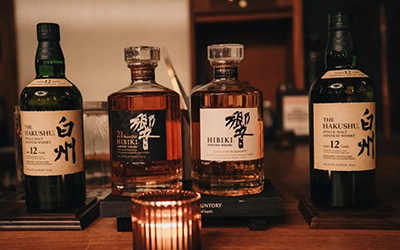
The House of Suntory DOJO in NYC
Analogue – 19 W 8th St, New York, NY 10011, NYC, November, 2023
2023 – Japanese Calligraphy Workshop program

Analogue – 19 W 8th St, New York, NY 10011, NYC, November, 2023
2023 – Japanese Calligraphy Workshop program
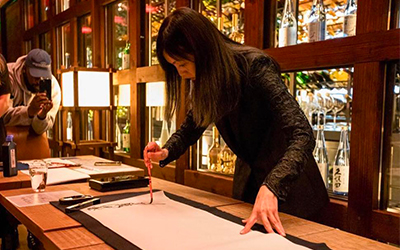
Shoto (Japanese restaurant), WASHINGTON DC, October, 2023
2023 – Japanese Calligraphy Workshop program
Suntory’s Whisky Hibiki is a truly harmonious blend rich in Japanese nature and craftsmanship like Japanese calligraphy often draws inspiration from nature and achieving a sense of balance and proportion is vital.
We practiced Japanese kanji for the word ‘’ Blending ‘’ 混合(Kongo).

WILLIAMSTOWN, MA
— Performance based on stories from the Tale of Genji and the Tale of Heike. These are among the best-known works of classical Japanese literature. Prosperity and decline, karma, novelty, love, sickness, and death, the transient nature of our lives and all of which surrounds us are recurring themes in classical Japanese literature.
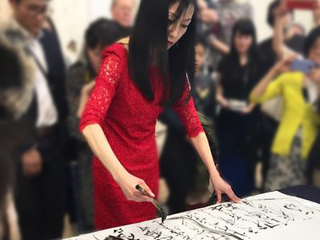
NEW YORK, NY
— Utsuroi Transition is an exhibition of 14 Shodo (Japanese calligraphy) art works in various styles, ranging from traditional to modern. The meaning of Utsuroi is best translated as “transition” in the spirit of the changing seasons, here expressed in such works as Golden Rain (2015), Late Snow Fall (2015) and Flower Field (2015).

NEW YORK, NY
— Hyakunin Issue “One Hundred Poems by One Hundred Poets” Compiled by Fujiwara Teika (1162-1241), Hyakunin Isshu is a celebrated anthology comprising one 31-syllable Tanka poem by each of one hundred poets.
Heike Monogatari (Tale of Heike). The Story of heike is an epic account of the struggle between the Taira and Minamoto clans for control of japan at the end of the 12th century in the Genpei War (1180-1185). The central theme of the story is the Buddhist law of impermanence.
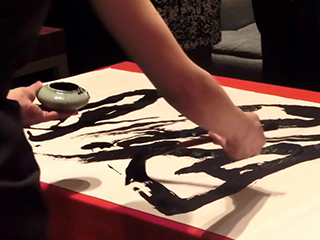
PARK HOTEL TOKYO, JAPAN
— The Park Hotel Tokyo, in December 2012, started the “Artist in Hotel” project where an artist decorates an entire guest rooms. All the guest rooms on the 31st floor will be so decorated. For my performance I reproduced one of the pieces I created for the Artist Room “One Hundred Poems by Masako Inkyo.”
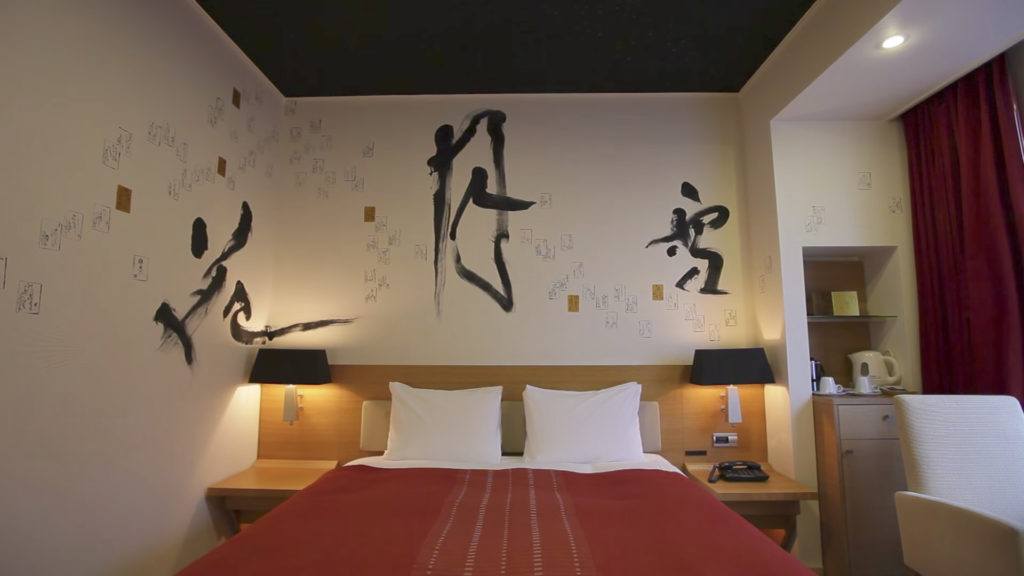
“The truth is, hiragana really has this kind of freedom.” It was as though this thought physically struck me in the back of the head the first time I saw the room she created. This was at the very beginning of the “Artist in Hotel” project to, basically, turn hotel rooms into works of art, putting words and images directly onto their walls and ceilings. We had no idea how it would turn out and were desperately looking for artists who had the ability to undertake this challenge. It was during this time that I was brought together with Master Inkyo. She presented an innovative plan.
First, treat the walls as folding screens. Then, have a Milky Way of kana flow across the sky along with clouds pouring down rain of one hundred poems from one hundred poets. Across the front wall, the seasons would be represented by the classic Japanese word “Setsugekka”, meaning “snow, moon, flower”, which alludes to the seasons. The overall theme would be the classic text “One Hundred Poets, One Hundred Poems” (Hyakunin Isshu). It was perfect for our goal of introducing the beauty of Japan to visitors from other countries. This is how the room was transformed into a beautiful art space.
There is nothing else I can say about it. The delicacy and strength of the writings and their beauty backed up by such technical skill. Even if written vertically on the walls, her writing loses none of its power. I truly thank you, Master Inkyo. It is my hope to share your work with many guests.”
Hotel Manager, Park Hotel Tokyo